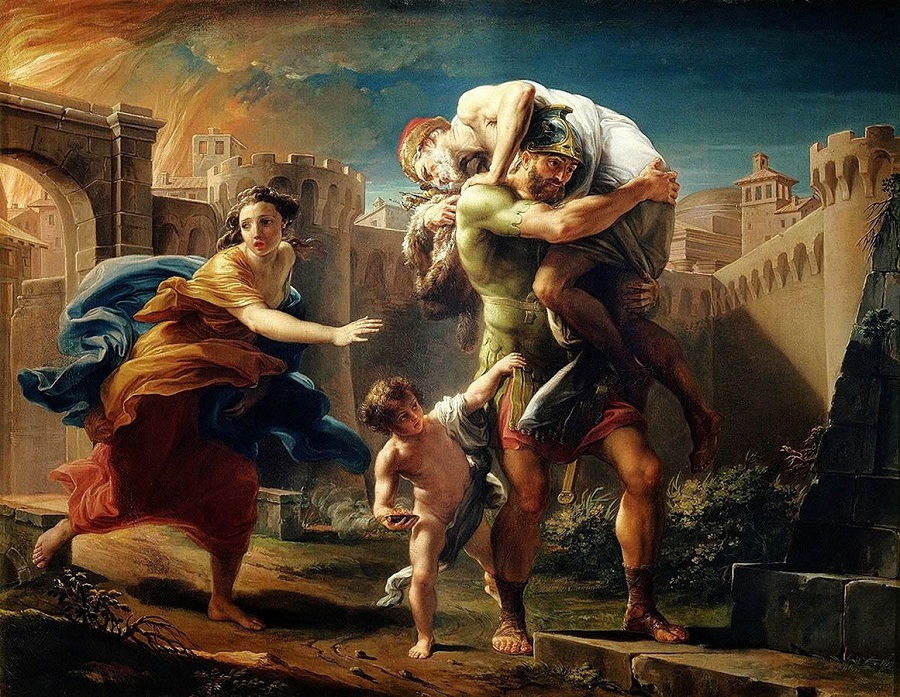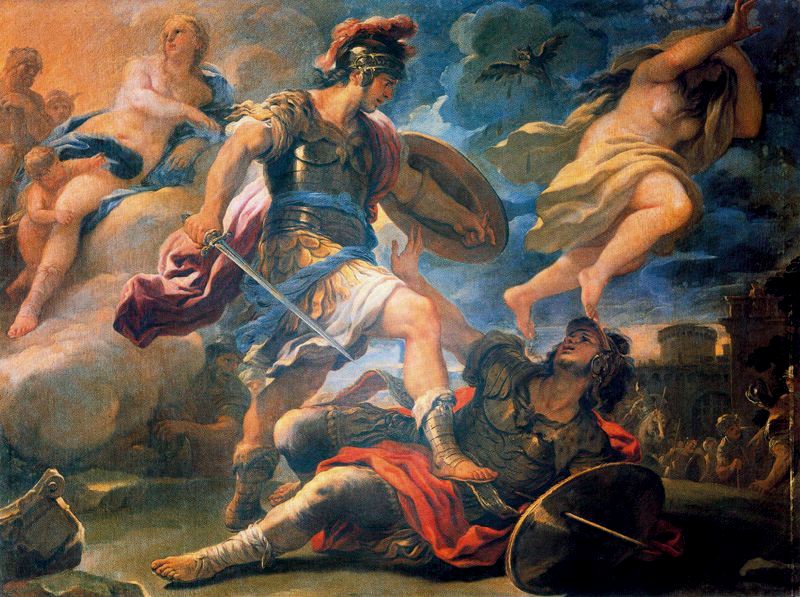
Virgil’s epic poem the Aeneid tells the story of Aeneas and his people, the Trojans, as they flee from their destroyed home of Troy (the Trojan War is recounted in Homer’s Iliad) and venture to Italy to build a new home; the descendants of Aeneas himself (Romulus and Remus) are destined to become the founders of Rome. The first half of the poem recounts the Trojans’ journey to Italy, while the second half recounts the war that breaks out between the Trojans and the Italians, a war kicked off thanks to petty divine intervention by Juno, wife of Jupiter and queen of the gods.
The character arc of Aeneas – the protagonist of the poem who is, “famous for his piety,” (page 3) – provides an arguably excellent example of what occurs as a result of living a blue pill life as a man. We should begin by noting the importance of Aeneas’, “piety,” as it is his defining characteristic and one of the four virtues inscribed on the shield of Augustus (the first Roman emperor and the one during whose reign Virgil wrote the poem); the Latin term for this is pietas, which refers not only to religious devotion, but also to loyalty to one’s family and one’s compatriots and thus selflessness.
The enforced adherence to pietas occurs in a manner that is reminiscent of the blue pill existence by demanding numerous sacrifices from Aeneas in the service of a seemingly noble yet distant and nebulous ideal. In Book II of the Aeneid, Aeneas tells the story of the fall of Troy, which resulted in the death of his wife, Creusa. While Aeneas is running through the burning city, trying to find her – he lost track of her while initially escaping – he encounters her ghost, who tells him that her death would not have happened, “without the approval of the gods,” (as a ghost, she has been to the underworld and can thus see the future) also instructing him to wipe, “away the tears you are shedding for Creusa whom you loved,” (page 47) because they will change nothing. Aeneas notes that he was left, “there in tears and longing to reply,” to her and yet was unable to do so.
The loss of Creusa is arguably the first major sacrifice demanded by the gods – specifically, as Creusa notes, it is the, “Great Mother of the Gods,” (page 47) referring to Juno – from Aeneas, and yet it is a sacrifice made without consent (it occurs because destiny has it that Aeneas will marry another woman named Lavinia, with whom he will give birth to the ancestors of Romulus and Remus). Aeneas is simply forced to accept this tragedy, and its justification is that it serves a higher purpose; even though Aeneas is committed to serving said higher purpose, the death of his wife still takes an understandable toll on him.
The second major sacrifice demanded of him is the severing of his relationship with Dido, the queen of Carthage, in Book IV. Aeneas and Dido fall in love after the Trojans land in Carthage – and have sex for the first time thanks to cynical divine intervention from Juno – but Jupiter (king of the gods) sends his messenger Mercury down to order Aeneas to leave Dido and resume his journey to Italy.
Jupiter questions – in an arguably paternalistic fashion, as if he knows what is better for Aeneas than Aeneas himself – whether, “the glory of such a destiny [becoming a venerated figure in Roman legend] does not fire his heart.” (page 76) When Dido eventually catches Aeneas trying to leave Carthage secretly, Aeneas makes this juxtaposition between what he desires and what the gods demand of him explicit when he states that, “It is not by my own will that I search for Italy.” (page 79) West, the translator, points out in the introduction that the, “weakness and misery,” that Aeneas shows upon being confronted by Dido are signs of, “Virgil’s human understanding,” (page xix) and a contribution to the contrast between the humanity of those on the ground and the wilful apathy of those above.
It is arguably the case that blue pill men live a life characterised by an internal conflict between what they consider to be their duty to the blue pill world around them and the women in their lives on one side, and their own personal desires on the other. Such a life involves the subjugation of the latter to the former in the name of being a ‘good man‘ or a ‘male ally‘, ideals of masculinity which we red pill men know are meaningless. The one distinction I would draw between the average blue pill man and Aeneas, however, is that this process involves more consent from the blue pill man than it does from Aeneas; such men must fully submit to the loss of their individuality and make the necessary sacrifices to do so, while Aeneas genuinely has far less control over this process.
We must also analyse the conclusion of the Aeneid to get a picture of the final destination to which blue pill thinking inevitably leads men. In the final lines of Book XII, Aeneas slays Turnus, prince of the Rutulians (one of the Italian tribes that are at war with the Trojans), the justification for which has been debated by many scholars. The killing of Turnus is certainly at odds with pietas (it has nothing to do with devotion to either the gods or anybody), and it goes directly against another one of the aforementioned four virtues – clementia, which means ‘mercy’ (it’s where we get the word ‘clemency’ from). By the time that Aeneas kills him, Turnus is lying on the ground and begging for mercy, after Aeneas’ spear strikes him in, “the middle of the thigh,” (page 290) and cripples him; Turnus also has his strength sapped from his body thanks to divine intervention from Jupiter, ensuring that he had no chance of winning the duel.

Virgil applies the adjective furiis to Aeneas’ emotional state as he is about to kill Turnus, an adjective that is related to the Latin term furor, which can mean ‘frenzy’ or ‘rage’ or ‘madness’. Furor is significant in that it is depicted as being the opposite of pietas, Aeneas’ defining characteristic; furor connotes letting one’s emotions control one’s actions (instead of one’s devotion to the gods or to others) and being excessively (or, as the Romans would argue, immorally) selfish, being at odds with the selflessness associated with pietas. Aeneas adopting the characteristic of furor is like Jesus succumbing to the temptations of Satan, or Michael Kimmel starting to respect men; it’s completely against his nature. So why does he do it?
My argument as to why Aeneas disregards the ethical code outlined on the shield of Augustus is because he sees no value in adhering to it by the end of the poem. Fulfilling his destiny is a task that has involved many sacrifices for him – namely the deaths of Creusa, Dido, his father Anchises (Book III), and the loyal son Pallas of his ally King Evander (Book X), all losses over which Aeneas grieves humanely – and yet Aeneas has not been justly compensated for these sacrifices, as his understandable human troubles have been ignored and only viewed as obstacles by Jupiter to the accomplishment of this goal. The promise of glory does not fully satisfy Aeneas – this is the type of promise, by the way, that contributes to the male disposability that characterises wars – and it is entirely understandable as to why.
The killing of Turnus lacks a clear moral justification because Aeneas does not believe that one is necessary when those who have been forcing him to abide by that code evidently do not care at all for his wellbeing. This killing is like the existential implosion of a man who has just realised the shallowness of his own value structure, carried out with a nihilistic and Cain-esque fury reminiscent of men who murder their wives over unjust divorces. It is no wonder that such is the case, given that the structure of the idea of fate/destiny – where there is a predetermined end at which one will arrive, by whatever means necessary – resembles that of a lie (because when you lie, you choose an end ahead of time at which you want to arrive, and manipulate everyone and everything around you as much as is necessary to get there).
By the end of the poem, Aeneas has little to nothing of value to call his own, and so he curses Jupiter and destiny – or, in other words, the world around him – for stealing from him what he once loved, and the loss of faith in the proposition that existence is worthwhile is almost always accompanied by undeserved and futile (in the sense that existence can never be destroyed by acts of revenge committed against it) death.
The core lesson that we red pill men can learn from the Aeneid, brilliantly written as it was by Virgil, is that the subjugation of our will to external moral obligations that society expects us to adopt unquestioningly only contributes to the, “modern genocide on the male soul,” that Paul Elam describes in his video ‘Servant, Slave and Scapegoat‘ as being mercilessly conducted by the blue pill world. No matter what the dictates of those whom men perceive to be their gods may be, you must understand that your will is your own and that it can only be broken with your consent.
_____________________
Note: All page references to the Aeneid are to the Penguin Classics edition, translated by David West.